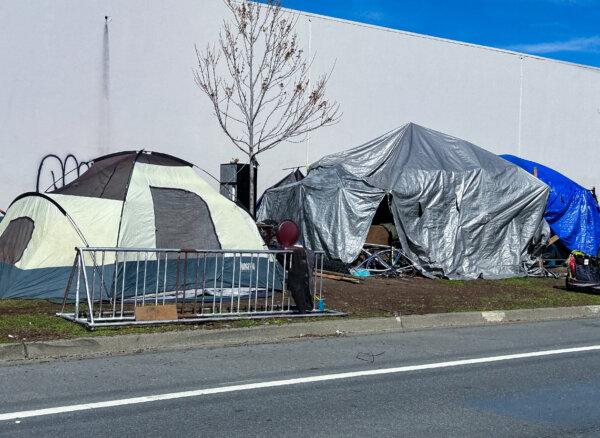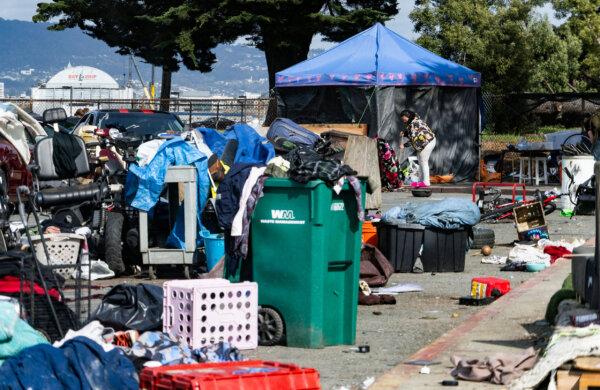Democratic lawmakers on the Senate Public Safety Committee rejected a bipartisan bill on April 16 that would have prohibited homeless individuals from camping on streets or sidewalks when shelter space is available.
The measure, Senate Bill 1011—introduced by Republican Leader Sen. Brian W. Jones—also would have banned encampments within 500 feet of schools, in open spaces, and at transit stops.
Violations would be punishable by a misdemeanor, and belongings could be cleared if law enforcement provided 72-hour notice.
The proposal was modeled after similar laws enacted in San Diego last year, which helped reduce homelessness in that city, according to supporters.
“This is a very common-sense bill that would move the needle in a positive direction,” Mr. Jones told The Epoch Times on April 16. “The bill is narrowly tailored to protect public safety in certain specific areas, and I think that’s the minimum that the Legislature should be doing to keep our families, our elderly, and our children safe in the neighborhoods where these encampments continue to spring up.”
He expressed frustration that those opposed offered no alternatives.
“We want to find common solutions, we want to work together, so give us some ideas,” he said. “They offered nothing, no ideas, just opposition. The opposition to the bill is a global response opposing anything having [to] do with homelessness.”
Given the growing number of homeless and public safety issues related to encampments for those living in and around impacted areas, he said the status quo is not sustainable.
“It’s unacceptable that we continue to allow this to happen.” Mr. Jones said.
Noting that $24 billion has already been spent by the state in the past five years to address the issue, with homeless counts ballooning in the same period, supporters argued Californians are paying the price and having to suffer because of a lack of a workable solution.
But more than a dozen opposed to the measure urged the panel to reject the bill.
“We are opposing this bill because it is inhumane and will result in the disappearance and exclusion of unhoused people,” Brandon Greene, director of policy advocacy for the Western Center on Law and Poverty, testified during the hearing. “This would further entrench people within the criminal legal system and saddle them with debt they can’t pay.”

The "Camp Integrity" homeless encampment on Andersen Drive in San Rafael, Calif., on April 16, 2024. (Brian Back/The Epoch Times)
He argued lawmakers created the problem and said more affordable housing and rent assistance programs would be more effective than banning encampments.
“We know that the solution to houselessness is more homes and more affordable housing,” Mr. Greene said. “And this bill does neither and [passes] the buck to unhoused people instead of the government that is actually responsible for the problem.”
Multiple lawmakers agreed and said local governments should act if they want to enact such laws.
“Yes, our residents do not want to see encampments, and I totally appreciate that,” committee member Sen. Nancy Skinner said during the hearing. “But I cannot support a statewide bill that does this.”
She said that a lack of affordable housing is to blame for the state’s homelessness and laid blame on cities and counties for restrictive zoning rules over the past four decades.
“This is one of those debates: Whose problem is it really?” Ms. Skinner said. “California’s local governments have suppressed the supply of housing.”
One fellow Democratic committee member in charge of the committee echoed her colleagues’ sentiments and called for more housing and fewer rules against encampments.
“Just because individuals that are unhoused make people uncomfortable does not mean that it should be criminalized,” Sen. Aisha Wahab, chair of the safety committee, said before voting against the bill. “This is an incredibly important issue. However, I don’t think this is an appropriate way to engage on this particular matter.”
Democratic co-author Catherine Blakespear acknowledged the criticisms from opponents but countered that a balance is needed to preserve the rights of all Californians.

A homeless encampment in Oakland, Calif., on March 25, 2024. (John Fredricks/The Epoch Times)
“We need to do better to serve our neighbors who are unhoused, and we deserve to have our public spaces, parks, sidewalks, and trails available for public use,” Ms. Blakespear said during the hearing. “While we are waiting for this to happen, we do nothing to address the urgent, catastrophic humanitarian crisis that is growing every single month on our streets.”
She urged the committee to recognize the severity of the problem and balance compassion for the homeless with the rights of all community members.
“We need to fight to do better by people by working at both ends of the problem,” she said. “Collectively, we have to be clear-eyed here that by allowing our public spaces to become sleeping spaces, we are tolerating this ... [and] allowing it to happen.”
Highlighting the list of co-authors from both parties, she asked the panel to consider the bill as a step toward addressing the difficult situation.
“It is truly and deeply horrifying how people are living and what we are tolerating,” Ms. Blakespear said. “SB 1011 is a responsible and humane approach.”
The mayor of one California city testified in support of the bill, telling lawmakers that students in his city are walking to school while encountering indescribable vulgarities, including public nudity, drug use, profanity, harassment, and unsanitary conditions.
“We need better tools in our cities to address these problems,” John Franklin, mayor of Vista in San Diego County, said during the meeting.
Republican committee member Kelly Seyarto argued in support of the measure that more must be done to address the problem.
“Right now, we’re not doing anything,” Mr Seyarto said during the meeting. “And this is just a step to make people start doing something.”
The five-member committee ultimately voted 3–1 against the bill, with one member abstaining, but in a second vote, agreed unanimously to reconsider it.
Mr. Jones told The Epoch Times the bipartisan co-authors will continue working with committee members and their staff to identify a potential path to success but said no amendments have been proposed.














